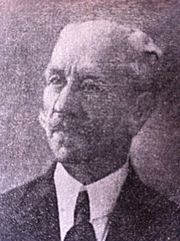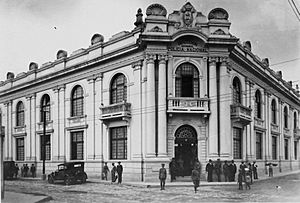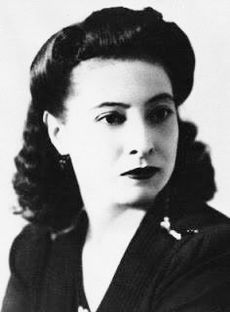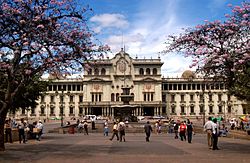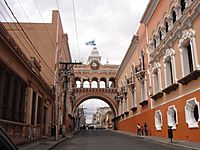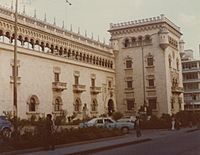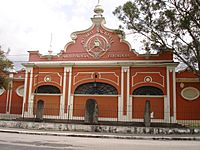Jorge Ubico facts for kids
Quick facts for kids
General of Division
Jorge Ubico Castañeda
|
|
|---|---|
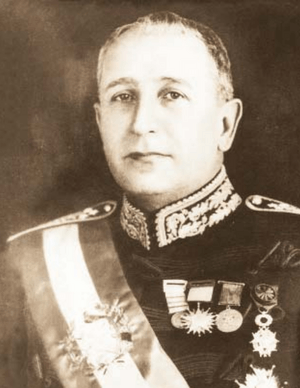 |
|
| 21st President of Guatemala | |
| In office 14 February 1931 – 1 July 1944 |
|
| Preceded by | José María Reina |
| Succeeded by | Federico Ponce Vaides |
| Leader of the Liberal Progressive Party of Guatemala | |
| In office 1926 – 1 July 1944 |
|
| Personal details | |
| Born | 10 November 1878 Guatemala City, Guatemala |
| Died | 14 June 1946 (aged 67) New Orleans, Louisiana, U.S. |
| Political party | Progressive Liberal Party |
| Spouses |
Marta Lainfiesta Dorión
(m. 1905–1946) |
| Profession | Soldier |
| Signature |  |
| Nicknames | Number Five Central America's Napoleon |
| Military service | |
| Allegiance | |
| Branch/service | Military of Guatemala |
| Years of service | 1896–1944 |
| Rank | General |
| Battles/wars | Second and Third Totoposte Wars 1921 Guatemalan coup d'état |
Jorge Ubico Castañeda (born November 10, 1878 – died June 14, 1946) was a leader of Guatemala. People called him Number Five or Central America's Napoleon. He was a general in the Guatemalan army.
In 1931, he became president in an election where he was the only person running. He continued policies that gave a lot of power to the United Fruit Company and rich landowners. He also supported strict rules for workers. Ubico was known as a very strict ruler. He was removed from power in 1944 by a movement that wanted more democracy. This event started the ten-year Guatemalan Revolution.
Contents
Early Life and Career
Jorge Ubico was the son of Arturo Ubico Urruela. His father was a lawyer and a politician in Guatemala. Jorge Ubico went to top schools in Guatemala. He also studied in the United States and Europe.
By 1897, Ubico joined the Guatemalan army as a second lieutenant. He quickly moved up in rank. After a military fight against El Salvador, he became a colonel at age 28. A year later, he became the governor (jefe politico) of Alta Verapaz. Four years after that, he became governor of Retalhuleu.
As governor, he made many improvements. He helped with public works, schools, and health. In 1918, he fought a yellow fever outbreak. He drained swamps and gave out free medicine. He became known for being tough on crime. He stopped banditry and smuggling near the Mexican border.
In 1921, he went back to Guatemala City. He helped in a coup that put General José Orellana in power. This happened because the old president would not agree to deals with the United Fruit Company. Ubico became Secretary of War in 1922 but left a year later. In 1926, he ran for president but did not win. He then went to his farm until the next election.
Political Changes in Guatemala
In December 1930, President Lazaro Chacón had to resign due to illness. At this time, Guatemala was struggling with the Great Depression. The country was almost bankrupt. Chacón's replacement, Baudilio Palma, was removed from power after only four days. Then, General Manuel María Orellana took over.
The United States did not support this new government. They demanded Orellana step down. He was forced to leave the presidency. José María Reina Andrade then became president.
Becoming President
The Liberal Party joined with the Progressives. They chose Ubico to be the next president. In the election, Ubico was the only candidate. In February 1931, he won with many votes.
When he became president, he promised to lead Guatemala "toward civilization." Once in office, he started to make changes. He also took on very strong powers as a leader.
His Government
Strict Military Rule
Ubico's rule was very strict. One visitor in 1941 said that Guatemala was "100 percent controlled by one man." This visitor also said Ubico had "spies and agents everywhere." He knew a lot about people's private lives. Guatemala under Ubico was sometimes called "a modern jail."
He made many parts of society more like the military. This included the post office, schools, and music groups. He put military officers in charge of many government jobs. He often traveled around the country. He would wear his army uniform and have a military escort. He even brought a radio station and a writer with him.
United Fruit Company and the U.S.
Ubico saw Guatemala as a close friend of the United States. He supported the U.S. to help Guatemala's economy. The United Fruit Company became the most important company in Guatemala under Ubico. The government gave it special tax breaks. It owned more land than anyone else. It also controlled the country's only railroad. It controlled the only power plants and the port at Puerto Barrios.
Middle Class Growth
The number of middle-class people grew a lot when Ubico was in power. However, his government mainly helped the rich landowners. The middle class felt left out of the government. They later led the movement that removed Ubico from power.
His Admiration for Napoleon
Ubico thought of himself as "another Napoleon". He greatly admired Napoleon Bonaparte. He liked to have his picture taken in his general's uniform. Even though he was taller and heavier than Napoleon, Ubico believed they looked alike. His nickname was "the Little Napoleon of the Tropics." He dressed in fancy clothes. He surrounded himself with statues and paintings of Napoleon. He often talked about how similar they looked.
Honesty in Government
Ubico was praised for being honest. He almost completely stopped corruption in Guatemala. Anyone found guilty of corruption was punished "instantly" and "severely." A law called the Probity Law made all public officials declare what they owned. They had to do this before and after their time in office. This law was strictly followed.
Resignation and Aftermath
Ubico's strict rules and proud manner led to a large uprising. This movement was led by teachers, professionals, and younger army officers. A school teacher named María Chinchilla Recinos died during a peaceful protest on June 25, 1944. This caused a huge outcry. Ubico resigned on July 1, 1944, during a general strike and protests across the country.
At first, he wanted to give power to General Roderico Anzueto. But his advisors knew Anzueto was not popular. So, Ubico chose three generals instead. They were Major General Buenaventura Piñeda, Major General Eduardo Villagrán Ariza, and General Federico Ponce Vaides.
The three generals promised to hold an election for a new president. But when the congress met, soldiers forced them to vote for General Ponce. Ponce took orders from Ubico. He kept many of Ubico's officials. The strict rules of Ubico's government continued.
Revolution and Overthrow
Groups against the government started to organize again. Many important military leaders joined them. Among these officers were Jacobo Árbenz Guzmán and Major Francisco Javier Arana. Ubico had fired Árbenz from his teaching job. Árbenz had been in El Salvador organizing a group of revolutionaries.
On October 19, 1944, a small group of soldiers and students attacked the National Palace. This event became known as the "October Revolution." Ponce was defeated and had to leave the country. Árbenz, Arana, and a lawyer named Jorge Toriello formed a temporary government called a junta. They held democratic elections before the end of the year. A professor named Juan José Arévalo won these elections.
Life in Exile and Death
After leaving power, Ubico went to live in New Orleans in the U.S. He died there from lung cancer on June 14, 1946.
Gallery
See also
 In Spanish: Jorge Ubico Castañeda para niños
In Spanish: Jorge Ubico Castañeda para niños
 | DeHart Hubbard |
 | Wilma Rudolph |
 | Jesse Owens |
 | Jackie Joyner-Kersee |
 | Major Taylor |


